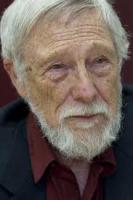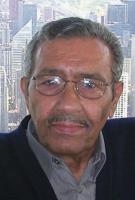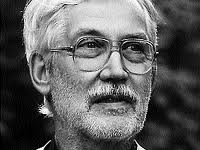May 8, 2012
Edited by David Sanders
Specimen Days
May 8, 2012
1592 – Francis Quarles, English poet (Argalus & Parthenia, Emblems), is born.
1781 – Richard Jago, English poet (b. 1715), dies.
1930 – Gary Snyder, beat poet (Rip Rap & Cold Mountain Poems), is born.
2000 – Guadalupe “Pita” Amor, Mexican poet (b. 1918), dies.
 Pine Tree Tops
Pine Tree Tops
In the blue night
frost haze, the sky glows
with the moon
pine tree tops
bend snow-blue, fade
into sky, frost, starlight.
The creak of boots.
Rabbit tracks, deer tracks,
what do we know.
—Gary Snyder
Poetry In The News
Grading Obama’s “Classic Undergraduate-ese”
 Earlier today, Intel poked a little fun at Barack Obama’s youthful love letters, which, as one of our astute commenters pointed out, read a bit like he was simply repurposing his Columbia coursework in order to correspond with his long-distance paramour. We began to wonder: What kind of grade would he have gotten for such T.S. Eliot analysis as “Eliot contains the same ecstatic vision which runs from Münzer to Yeats. However, he retains a grounding in the social reality/order of his time” and “Of course, the dichotomy he maintains is reactionary, but it’s due to a deep fatalism, not ignorance,” a reading that was admittedly done without perusing the footnotes? We checked in with some current members of the Columbia English department. Read more at New York Magazine.
Earlier today, Intel poked a little fun at Barack Obama’s youthful love letters, which, as one of our astute commenters pointed out, read a bit like he was simply repurposing his Columbia coursework in order to correspond with his long-distance paramour. We began to wonder: What kind of grade would he have gotten for such T.S. Eliot analysis as “Eliot contains the same ecstatic vision which runs from Münzer to Yeats. However, he retains a grounding in the social reality/order of his time” and “Of course, the dichotomy he maintains is reactionary, but it’s due to a deep fatalism, not ignorance,” a reading that was admittedly done without perusing the footnotes? We checked in with some current members of the Columbia English department. Read more at New York Magazine.
Poets’ Words Will be Part of Artwork on Local Barns
Barn murals in Frostburg and Mount Savage will feature the work of two local poets — one of them Pulitzer Prize-winner Stephen Dunn. Cumberland artist Bill Dunlap has already started painting the side of a barn at Carey Run Forge blacksmith studio near Frostburg and plans to begin work this summer on a barn at Cedar Rock Farm in Mount Savage. Read more at the Cumberland Times-News.
The String of Bad Luck and Accidents that Killed Sylvia Plath
 The anguish former Poet Laureate Ted Hughes felt over the suicide of his first wife is revealed in letters published for the first time. They show how he struggled to cope with Sylvia Plath’s death and the idea – voiced by some feminists – that he was somehow to blame. Read more at the Daily Mail.
The anguish former Poet Laureate Ted Hughes felt over the suicide of his first wife is revealed in letters published for the first time. They show how he struggled to cope with Sylvia Plath’s death and the idea – voiced by some feminists – that he was somehow to blame. Read more at the Daily Mail.
World Poetry
Taliban Poetry Book Denounced by Former British Commander
 Rashid Yaseen Abbas, who died Monday in St. Louis, was an internationally known Iraqi poet and critic who wrote of his people’s struggle for freedom and their repression, first under the British and later under a series of homegrown strongmen. He wrote “The Knight of Death,” an unabashed attack on Saddam Hussein, the dictator who killed hundreds of thousands of his countrymen. Saddam, who was hanged in 2006, liked to call himself a knight. “Decades of life have passed while you drank the blood and you still are thirsty and cannot be satisfied,” Professor Abbas wrote. Read more at St. Louis Today.
Rashid Yaseen Abbas, who died Monday in St. Louis, was an internationally known Iraqi poet and critic who wrote of his people’s struggle for freedom and their repression, first under the British and later under a series of homegrown strongmen. He wrote “The Knight of Death,” an unabashed attack on Saddam Hussein, the dictator who killed hundreds of thousands of his countrymen. Saddam, who was hanged in 2006, liked to call himself a knight. “Decades of life have passed while you drank the blood and you still are thirsty and cannot be satisfied,” Professor Abbas wrote. Read more at St. Louis Today.
New Books
The Alphabet Not Unlike the World: Poems by Katrina Vandenberg
 [Paperback] Milkweed Editions, 96 pp., $16.00
[Paperback] Milkweed Editions, 96 pp., $16.00
In her accomplished second collection of poems, Katrina Vandenberg writes from the intersection of power and forgiveness. With poems named for letters of the Phoenician alphabet, and employing such innovative forms as the ancient ghazal, Vandenberg deciphers the seemingly indecipherable in this extraordinary becoming of self through language. Moving between the physical and the abstract, the individual and the collective, The Alphabet Not Unlike the World unearths meaning—with astonishing beauty—from the pain of loss and separation.
Mountains of the Moon by Greg Kuzma
[Paperback] Stephen F. Austin University Press, 144 pp., $15.95
Greg Kuzma’s Mountains of the Moon is the second selection from his longer poems. The first, All That is Not Given is Lost, was published in 2007 by Backwaters Press. A third volume is in preparation. Kuzma’s gift is his ability to slip deeply into the territories of human soul, where he teaches us to endure against loss, to ascend from despair, and to celebrate how beautiful imperfect lives may be.
N18 (Complete) by Hank Lazar
 [Paperback] Singing Horse Press, 84 pp., $15.00
[Paperback] Singing Horse Press, 84 pp., $15.00
“If angels could sing we would not understand them. But angels do understand our songs and Hank Lazer’s N18 is the pure product of such listening. Philosophical notations, lyric utterances, journal entries, and aphoristic gleanings are set in a holographic space of the imaginary’s shapes. Human readers, hearken to these calls as they echo into silence.” — Charles Bernstein
On the Spectrum of Possible Deaths by Lucia Perillo
[Hardcover] Copper Canyon Press, 96 pp., $22.00
The poetry of Lucia Perillo is fierce, tragicomic, and contrarian, with subjects ranging from coyotes and Scotch broom to local elections and family history. Formally braided, Perillo gathers strands of the mythic and mundane, of media and daily life, as she faces the treachery of illness and draws readers into poems rich in image and story.
Recent Reviews
Infected by Time
by Calvin Bedient
It takes confidence to name a collection of poems Place and even more to name a poem “Earth.” Such titles might suggest a dull positivism, a lapse of imagination (“Lapse” is another of the titles). Jorie Graham can afford these big-everything titles because she is never less than in dialogue with everything. She is the world champion at shot-putting the great questions. It hardly matters what the title is: the subject itself is always “the outermost question being asked me by the World today.” What counts is the hope in the questioning itself, not the answers. The answers can be summed up in the following words from “Untitled”: “we have other plans for your life says the world.” Read more at the LA Review of Books.
Jaan Kaplinski: A Particular Sort of Ignorance
 by Peter Stirr
by Peter Stirr
It’s hard to think of a poet besides Jaan Kaplinski who could write lines like
In the morning I was presented to President Mitterand,
in the evening I weeded out nettles under the currant bushes.
The lines remind us of the poet’s public life – he was a member of the post-Revolution Estonian parliament from 1992 to 1995, and is an active cultural commentator – but they also suggest where his priorities might lie. Meeting presidents is one thing but the real life is elsewhere. Read more at the Cat Flap.
Correspondences
Jonathan Galassi with Adam Fitzgerald
by Adam Fitzgerald
This past March, a new book of Galassi’s poems, Left-handed (Knopf, 2012) was released, proving Galassi continues to be one of the most productive of writers: as poet, translator, and editor. I had the pleasure to sit down with Galassi late last year and discuss his work with Leopardi, but soon our conversation drifted along the waters of many interrelated projects and passions he has had nearly his whole life. Read more at the Brooklyn Rail.
David Trinidad
 by Jen Schomburg Kanke
by Jen Schomburg Kanke
David Trinidad’s most recent book, Dear Prudence: New and Selected Poems, was published in 2011 by Turtle Point Press. His other books include The Late Show (2007), By Myself (with D.A. Powell, 2009), and Plasticville (2000), all published by Turtle Point. He is also the editor of A Fast Life: The Collected Poems of Tim Dlugos (Nightboat Books, 2011). Trinidad teaches poetry at Columbia College Chicago, where he co-edits the journal Court Green. Read more at Southeast Review.
Broadsides
“Queer Light”: Hecht, Bishop and Bosch
by Gregory Dowling
The criticism of major poets often intrigues us for two reasons: for the light it throws on the subject they are discussing and the light it throws on their own works. This is certainly the case with Anthony Hecht, and, perhaps especially so in the case of his writings on Elizabeth Bishop. He wrote two essays on the poet; the first was a lengthy review of Geography III, which was collected in his book Obbligati (1986); the second, collected in Melodies Unheard (2003), is self-explanatorily entitled, “Two Poems by Elizabeth Bishop,”and discusses “Wading at Wellfleet” and “The Man Moth.” It is the latter essay that I wish to focus on, and particularly his engagement with “The Man-Moth”—and even more particularly the intriguing comparison he makes with a painting by Hieronymus Bosch. My aim is not only to explore the reasons for Hecht’s fascination with the poem but also to see whether the comparison with Bosch throws a stronger light on Bishop’s poem or on Hecht’s concerns. Read more at Per Contra.
The Serious Play of Writing
by Zali Gurevitch
The stress on the poetical within social science comes as a call for experimentation in freer forms, and a change in the politics of utterance. It is imported into sociology and anthropology as a solution, a tool, a vessel. But it turns out that the problem of ethnography, as of theory, only redefines itself as a poetic problem. Read more at Poetry International.
Drafts & Fragments
Flow Chart for the”Love Song of J. Alfred Prufrock.”
Envoi: Editor’s Notes
Poetry on the Brink: Reinventing the Lyric
Marjorie Perloff
SAFETY FIRST
brief fast has made me dangerously
thirsty for juice.
—Craig Dworkin, Motes (2011)
Dejà vu?
What happens to poetry when everybody is a poet? In a recent lecture that poses this question, Jed Rasula notes:
The colleges and universities that offer graduate degrees in poetry employ about 1,800 faculty members to support the cause. But these are only 177 of the 458 institutions that teach creative writing. Taking those into account, the faculty dedicated to creative writing swells to more than 20,000. All these people must comply with the norms for faculty in those institutions, filing annual reports of their activities, in which the most important component is publication. With that in mind, I don’t need to spell out the truly exorbitant numbers involved. In a positive light, it has sanctioned a surfeit of small presses . . . to say nothing of all the Web-zines. Read more at Boston Review.
It would be worth your while to skim this essay by Marjorie Perloff and then read through some of the comments in response. My feeling is that the discussion concerns itself with asking the wrong thing of poetry. Although most might agree that mainstream poetry has become a harbor for the professional academics, I don’t understand why that matters. Who really cares, of those who care about poetry, about someone else’s ability to parlay his or her output into a career? Does Professor Perloff think that poetry is a zero-sum game; that if people didn’t read Pinsky, Hass, or Strand they would rush to read Bernstein, Howe, or Cage instead? Why not Wilbur, Gioia, or Stallings? After an informal survey I’ve been conducting for nearly forty years, I’ve noticed that most poets have little choice in how they write or what they write about. And there are enough different subjects and styles for readers to choose from to suit any taste. But the idea of some hierarchy, whether it’s based on the accolades bestowed by the “establishment” or the success of those seeking “to dislodge the dominant paradigm,” is a drifting away from what poetry could be about if we let it. Let’s not let “make it new” be the enemy of “make it good.” In the long run, immortality isn’t, I’m convinced, all it’s cracked up to be. Certainly not worth the chase.
—David Sanders
